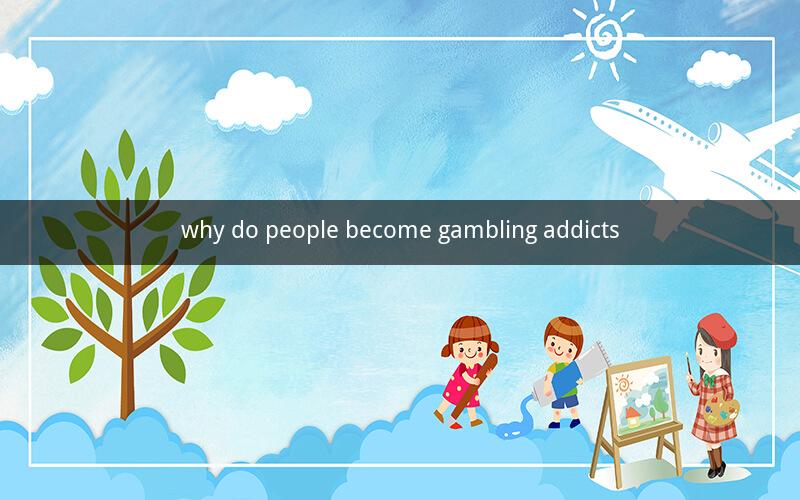
Table of Contents
1. Introduction to Gambling Addiction
2. The Psychological Factors
3. The Social and Environmental Influences
4. The Role of Biology
5. The Impact of Technology
6. Coping Mechanisms and Recovery
7. Conclusion
1. Introduction to Gambling Addiction
Gambling addiction, also known as problem gambling or compulsive gambling, is a behavioral disorder characterized by the inability to control the urge to gamble despite negative consequences. It is a complex issue that affects individuals from all walks of life, regardless of age, gender, or socioeconomic status. Understanding why people become gambling addicts requires an examination of various factors, including psychological, social, environmental, and biological influences.
2. The Psychological Factors
Psychological factors play a significant role in the development of gambling addiction. Individuals who are prone to addiction may have a genetic predisposition or may have experienced trauma or emotional distress in their past. These factors can lead to a desire for escape or relief from negative emotions through the thrill of gambling. Additionally, individuals with certain personality traits, such as impulsivity or thrill-seeking behavior, may be more susceptible to developing a gambling addiction.
3. The Social and Environmental Influences
Social and environmental factors can also contribute to the development of gambling addiction. Individuals who live in areas with easy access to gambling venues, such as casinos or racetracks, may be more likely to develop an addiction. Moreover, social pressures, such as the desire to fit in with a certain group or the need to impress others, can also encourage gambling behavior. Peer pressure and the influence of role models can also play a role in the development of gambling addiction.
4. The Role of Biology
Biology also plays a crucial role in the development of gambling addiction. Studies have shown that certain neurotransmitters, such as dopamine and serotonin, are involved in the reward and pleasure pathways of the brain. When individuals gamble, these neurotransmitters are released, creating a sense of euphoria and reinforcing the addictive behavior. Additionally, individuals with certain genetic markers may be more susceptible to the effects of these neurotransmitters, making them more prone to developing a gambling addiction.
5. The Impact of Technology
The advent of technology has made gambling more accessible than ever before. Online gambling platforms, mobile apps, and virtual reality casinos have made it easier for individuals to engage in gambling activities from the comfort of their own homes. This increased accessibility has contributed to the rise in gambling addiction cases, as individuals may find it harder to control their gambling behavior when it is readily available at their fingertips.
6. Coping Mechanisms and Recovery
For individuals struggling with gambling addiction, finding effective coping mechanisms and seeking recovery is essential. Therapy, such as cognitive-behavioral therapy (CBT), can help individuals identify and change negative thought patterns and behaviors associated with gambling. Support groups, such as Gamblers Anonymous, can provide individuals with a sense of community and support. Additionally, financial management strategies and accountability measures can help individuals regain control over their gambling behavior.
7. Conclusion
Understanding why people become gambling addicts is a complex task that requires examining various factors, including psychological, social, environmental, and biological influences. By addressing these factors, individuals can take steps to overcome their addiction and lead healthier, more fulfilling lives.
Questions and Answers
1. Q: What are the signs of a gambling addiction?
A: Signs of a gambling addiction include lying about gambling activities, spending increasing amounts of time and money on gambling, neglecting responsibilities, and experiencing negative consequences as a result of gambling.
2. Q: Can genetics play a role in gambling addiction?
A: Yes, genetics can play a role in gambling addiction. Certain genetic markers may make individuals more susceptible to the effects of neurotransmitters involved in the reward and pleasure pathways of the brain.
3. Q: How can technology contribute to gambling addiction?
A: Technology can contribute to gambling addiction by making gambling more accessible and convenient. Online gambling platforms, mobile apps, and virtual reality casinos can make it easier for individuals to engage in gambling activities from the comfort of their own homes.
4. Q: What are some effective coping mechanisms for gambling addiction?
A: Effective coping mechanisms for gambling addiction include therapy, such as cognitive-behavioral therapy (CBT), support groups, financial management strategies, and accountability measures.
5. Q: Can social pressures contribute to gambling addiction?
A: Yes, social pressures, such as the desire to fit in with a certain group or the need to impress others, can contribute to gambling addiction. Peer pressure and the influence of role models can also play a role in the development of gambling addiction.
6. Q: How can therapy help individuals overcome gambling addiction?
A: Therapy, such as cognitive-behavioral therapy (CBT), can help individuals identify and change negative thought patterns and behaviors associated with gambling. It can also provide individuals with coping strategies and support.
7. Q: What is the role of biology in gambling addiction?
A: Biology plays a crucial role in gambling addiction. Certain neurotransmitters, such as dopamine and serotonin, are involved in the reward and pleasure pathways of the brain. When individuals gamble, these neurotransmitters are released, creating a sense of euphoria and reinforcing the addictive behavior.
8. Q: Can environmental factors contribute to gambling addiction?
A: Yes, environmental factors, such as easy access to gambling venues, can contribute to gambling addiction. Areas with a high concentration of gambling establishments may increase the likelihood of individuals developing an addiction.
9. Q: What are some common personality traits associated with gambling addiction?
A: Common personality traits associated with gambling addiction include impulsivity, thrill-seeking behavior, and a tendency to engage in risky activities.
10. Q: How can individuals seek help for gambling addiction?
A: Individuals can seek help for gambling addiction by seeking therapy, joining support groups, such as Gamblers Anonymous, or contacting helplines and hotlines dedicated to gambling addiction.